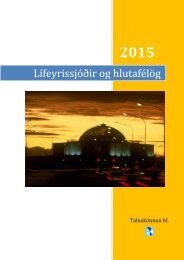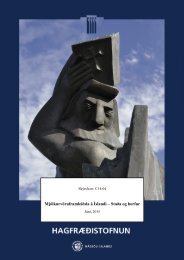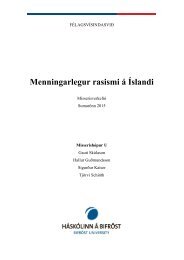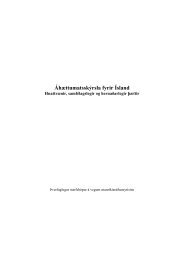You also want an ePaper? Increase the reach of your titles
YUMPU automatically turns print PDFs into web optimized ePapers that Google loves.
WORLD REPORT 2016<br />
HUMAN RIGHTS WATCH<br />
for survivors and to train law enforcement and judicial officials.<br />
Human Rights Institutions<br />
Parliament considered a draft law limiting the activities of and curbing the independence<br />
of the National Centre for the Prevention of Torture. Dissatisfied with<br />
the human rights ombudsman’s annual report, parliament dismissed him in<br />
June, in breach of stipulated procedures. The United Nations in the Kyrgyz Republic<br />
issued a statement that “the principles of independence and pluralism of<br />
Ombudsman Institutions are not sufficiently guaranteed” by law.<br />
Freedom of Expression<br />
Article 19, an international media freedom rights group, published a statement<br />
noting “how government officials frequently prevent journalists from accessing<br />
information of public interest,” despite an access to information law. In June, a<br />
court awarded 2 million som (US$27,750) in damages after the Prosecutor General’s<br />
Office, on behalf of President Almazbek Atambaev, sued a local journalist<br />
for defamation, after the journalist wrote about the June 2010 events.<br />
Some journalists face interference in their work. In March, national security officials<br />
arrested Umar Farooq, an American freelance journalist, in southern Kyrgyzstan,<br />
and accused him of possessing “extremist” material, charges he<br />
denied. Farooq was deported on March 29 for working without accreditation.<br />
Sexual Orientation and Gender Identity<br />
LGBT people in Kyrgyzstan experience ill-treatment, extortion, and discrimination<br />
from both state and non-state actors. There is widespread impunity for these<br />
abuses. In April, assailants firebombed the office of the LGBT rights group<br />
Labrys; no one was hurt. On May 17, International Day Against Homophobia, nationalist<br />
youth groups raided a private LGBT event at a café in Bishkek, threatening<br />
and filming those present at the event. The police opened an investigation<br />
on charges of hooliganism.<br />
Parliament continued to consider an anti-LGBT bill banning “propaganda of nontraditional<br />
sexual relations,” which appears aimed at silencing anyone seeking<br />
to openly share information about same-sex relations in Kyrgyzstan. When dis-<br />
cussing the draft law, public officials used homophobic and discriminatory rhetoric.<br />
Freedom of Religion<br />
The government has escalated its efforts to combat religious extremism, but<br />
many investigations have been accompanied by violations of detainees’ rights,<br />
according to local rights lawyers. Members of ethnic minorities are more vulnerable<br />
to abuse. In October, a court convicted popular Imam Rashot Kamalov to five<br />
years in prison on charges of inciting religious hatred and disseminating extremist<br />
material. His sentence was increased to 10 years in prison on appeal. Kamalov<br />
and his supporters believe he was targeted after publicly criticizing the<br />
police in December 2014.<br />
According to Forum 18, an international organization that promotes religious<br />
freedom, a new draft religion law appears not to address a Constitutional Chamber<br />
ruling from September 2014 finding components of the existing law unconstitutional,<br />
such as a restriction that a religious organization can only carry out<br />
activities at its legal address. Forum 18 also decried police abuse of Jehovah’s<br />
Witnesses, for example, during and after their gathering at a café in Osh in August.<br />
Key International Actors<br />
In January, Kyrgyzstan underwent its second Universal Periodic Review at the UN<br />
Human Rights Council. States commended Kyrgyzstan’s adoption of a new constitution<br />
in 2010 and of a national preventive mechanism against torture, but<br />
raised concerns about violence against LGBT people, draft “foreign agents,” and<br />
anti-LGBT “propaganda” bills, and the disproportionate prosecution and conviction<br />
of ethnic Uzbeks following the June 2010 violence.<br />
In April, the UN Committee on the Protection of the Rights of all Migrant Workers<br />
and Members of their Families identified discrimination against migrant workers,<br />
especially in employment, education, and health. It urged Kyrgyzstan to raise<br />
awareness among migrants to Russia, who “are often targets of hate crimes,”<br />
and provide consular assistance there.<br />
368<br />
369










